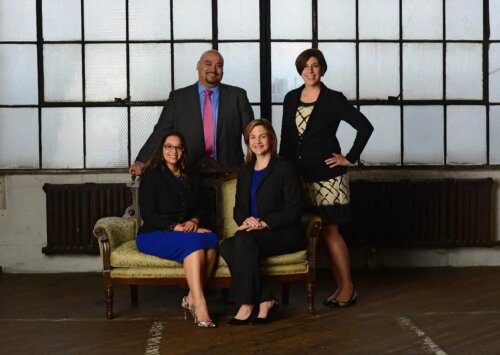Best Same Sex & LGBT Lawyers in United States
Share your needs with us, get contacted by law firms.
Free. Takes 2 min.
Free Guide to Hiring a Family Lawyer
Or refine your search by selecting a city:
List of the best lawyers in United States
About Same Sex & LGBT Law in United States
The landscape of Same Sex & LGBT law in the United States has evolved significantly over the past few decades. Milestones such as the legalization of same-sex marriage in 2015 through the landmark Supreme Court decision in Obergefell v. Hodges have set important precedents. Despite these strides, there are continuing battles for equality and protection under the law, including issues related to employment, healthcare, housing, and education. State and federal laws affect individuals in varying ways, emphasizing the importance of understanding both local and nationwide legal frameworks.
Why You May Need a Lawyer
Individuals in the LGBT community may require legal assistance for a wide range of issues. Common situations include discrimination in the workplace or housing, healthcare access issues, familial rights matters such as adoption or surrogacy, navigating legal gender transition processes, and understanding rights related to marriage and divorce. Additionally, instances of hate crimes or harassment may necessitate legal intervention to ensure protection and justice under the law. A knowledgeable lawyer can provide guidance, representation, and advocacy tailored to these unique challenges.
Local Laws Overview
Legal protections for LGBT individuals can vary significantly from state to state. While federal laws offer certain protections, states have the authority to enact their own regulations, which can either expand or limit rights. Key issues include anti-discrimination laws regarding employment, housing, and public accommodations. Some states have comprehensive legislation in place, while others may lack explicit protections against discrimination based on sexual orientation or gender identity. Additionally, family law and parental rights are areas where state laws greatly differ, affecting adoption and custody decisions.
Frequently Asked Questions
What rights are protected under the federal law for LGBT individuals?
Federal law prohibits discrimination based on sexual orientation and gender identity in employment under Title VII of the Civil Rights Act of 1964, following the Bostock v. Clayton County decision. Further protections may be available in housing and healthcare depending on jurisdiction and specific circumstances.
Can same-sex couples adopt children in the United States?
Yes, same-sex couples can adopt children, though the process and recognition of adoption rights may vary by state. Some states have more favorable adoption laws, while others might have additional legal hurdles or restrictions.
What is the process for legally changing one’s gender on official documents?
The process for legally changing one's gender on documents varies by state. It often involves obtaining a court order, updating documents such as birth certificates and driver’s licenses, and sometimes requires medical certification. Consulting a lawyer can be helpful in navigating this process.
Are there laws protecting LGBT students in schools?
Certain federal protections exist for LGBT students under Title IX, which prohibits discrimination based on sex, and this can extend to gender identity and sexual orientation. However, the application and enforcement can vary, with additional protections dependent on state and local policies.
How does the Supreme Court ruling on same-sex marriage affect religious institutions?
While the Supreme Court ruling guarantees the right to same-sex marriage, religious institutions retain the right to make decisions about marriage ceremonies based on their doctrines. However, they are still subject to civil rights laws when providing secular services.
What can I do if I face discrimination at work due to my sexual orientation?
If you face workplace discrimination based on sexual orientation, you can file a complaint with the Equal Employment Opportunity Commission (EEOC). Consulting with an attorney experienced in employment discrimination cases can help you navigate this process effectively.
Are there specific healthcare rights for transgender individuals?
The Affordable Care Act (ACA) prohibits discrimination based on gender identity, and transgender individuals have the right to receive healthcare without discrimination. However, the availability and coverage of care can vary, necessitating legal consultation for specific cases.
What protections exist for LGBT individuals in military service?
LGBT individuals can serve openly in the U.S. military. Policies about service eligibility have changed over time, and further guidance can be obtained from military legal services or specialized legal professionals.
How do hate crime laws apply to LGBT individuals?
Hate crime laws at the federal level include protections for crimes motivated by sexual orientation and gender identity. Many states have similar laws, though the specifics and the level of protection provided can differ.
What are civil unions and how do they differ from marriage?
Civil unions were initially created to give same-sex couples some rights similar to marriage before same-sex marriage was legalized. The rights and recognition of civil unions can vary by state, and they may not be recognized as marriages elsewhere.
Additional Resources
For those seeking further assistance, several resources are available such as the American Civil Liberties Union (ACLU), Lambda Legal, and local LGBT community centers. These organizations provide legal advocacy, resources, and support specific to LGBT legal matters. Governmental bodies like the Equal Employment Opportunity Commission (EEOC) and state civil rights offices can also be instrumental.
Next Steps
If you need legal assistance related to Same Sex & LGBT issues, it is recommended to contact a lawyer specializing in this field. Initial consultations can offer clarity on your legal standing and options. Use directories from the American Bar Association or local legal aid societies to find qualified legal professionals. Additionally, reaching out to LGBT advocacy groups can provide support and information to help navigate your legal journey.
Lawzana helps you find the best lawyers and law firms in United States through a curated and pre-screened list of qualified legal professionals. Our platform offers rankings and detailed profiles of attorneys and law firms, allowing you to compare based on practice areas, including Same Sex & LGBT, experience, and client feedback.
Each profile includes a description of the firm's areas of practice, client reviews, team members and partners, year of establishment, spoken languages, office locations, contact information, social media presence, and any published articles or resources. Most firms on our platform speak English and are experienced in both local and international legal matters.
Get a quote from top-rated law firms in United States — quickly, securely, and without unnecessary hassle.
Disclaimer:
The information provided on this page is for general informational purposes only and does not constitute legal advice. While we strive to ensure the accuracy and relevance of the content, legal information may change over time, and interpretations of the law can vary. You should always consult with a qualified legal professional for advice specific to your situation.
We disclaim all liability for actions taken or not taken based on the content of this page. If you believe any information is incorrect or outdated, please contact us, and we will review and update it where appropriate.
Browse same sex & lgbt law firms by state in United States
Refine your search by selecting a state.















